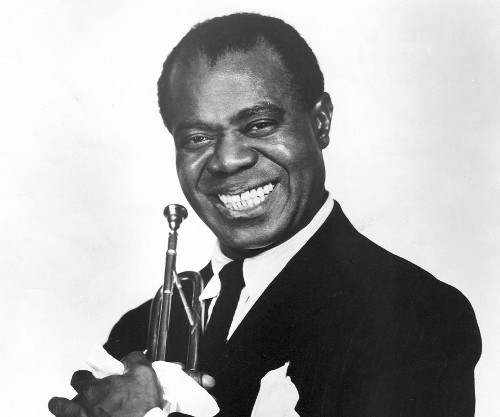 Above, Louis Armstrong. Louis Armstrong was an American trumpeter, composer, singer and occasional actor who was one of the most influential figures in jazz. His career spanned five decades, from the 1920s to the 1960s, and different eras in jazz.
Above, Louis Armstrong. Louis Armstrong was an American trumpeter, composer, singer and occasional actor who was one of the most influential figures in jazz. His career spanned five decades, from the 1920s to the 1960s, and different eras in jazz.
Mr Armstrong was a very talented and successful man who overcame many hurdles if life, not least racial discrimination. By the 1930s Mr Armstrong had acquired fame and career success. One of the challenges Mr Armstrong would have faced would have been getting a well fitting suit.
As the reader will know, when purchasing a suit, one had two choices. One can get one “made to measure” or one can buy one “off the shelf”. The made to measure suit is generally more expensive and is not immediately available as of course it has to me made. However, it has the very great advantage of being the right size and fit! If one desires a suit there and then and wishes to save a little money then an “off the shelf” or “ready made” suit will fill the bill. Whether or not the garment fits you in all particulars will depend on how close to what is known as “stock size” you are. Generally “off the shelf” garments had the sleeves somewhat over length than average and ditto the trousers. This for the obvious reason that shorting these is easier than lengthening them! Of course there are two ways of shortening the sleeves on a jacket (or “coat” as tailors call it). There is the correct way and there is the incorrect way. The correct way is to unpick the sleeve at the shoulder and take cloth and lining in and reattach. The labour involved is skilled and considerable and this is of course reflected in the cost. Which is what most shops offer the incorrect (and cheap and nasty) way of shortening the cuff.
Mr Armstrong however had a problem. Mr Armstrong’s problem was this: A man, who today is described as an “African American” who was formerly called “a black man” and before than “a coloured man” and before that “a Negro” would have been unable to purchase a “made to measure” suit from most stores as the white sales assistant or in the case of a bespoke tailor, the tailor himself, would refuse Mr Armstrong’s custom as they would deem it demeaning for them (a white man) to measure up a black man. This would also apply to measuring Mr Armstrong insofar as having an “off the shelf” garment altered to fit.
This to our younger readers this will seem extraordinary and outrageous, but this is how life was like years ago.
Mr Armstrong’s solution was to find a tailor or retailer who was a Negro.
WHAT HAS THIS TO DO WITH BREXIT!
We hear you shout Dear Reader!
THIS: Article 50 was drafted by politicians and civil servants every bit as prejudiced against the idea of a member state leaving their beloved European Union as any white tailor in New Orleans in the 1930s was with the idea of measuring up Mr Armstrong for a suit!
Article 50 was designed to make it difficult and costly for any member state to leave the EU.
The UK is in effect in the position Mr Armstrong was in in the 1930s insofar as buying a suit! No white salesman would measure him up! With no tailor of the same ethnicity he would have been in the position of buying “off the peg” and prevailing upon Mrs Armstrong to make the alterations!
There is a “ready made” off the peg” option for the UK insofar as Brexit is concerned. It is EFTA + EEA membership or Flexcit! This will still present a challenge to negotiate as the Spanish will almost certainly demand huge concessions vis-à-vis the issue of Britain’s fish.
This is what Dr. Richard North and your Editor insist that Brexit (EFTA + EEA) must be regarded as being part of a process and not a single event.
There can be little doubt that many British Gazette readers and certainly virtually all those readers who are also UKIP members, will wish and expect to see Britain’s fisherman get back what is rightfully theirs!
The reader should be in no doubt that the British Gazette wholeheartedly endorses this view!
However, this organ does not believe that this can be obtained immediately upon Brexit. Substantial concessions will likely have to be made due to the inherent weakness of the UK’s negotiating position that the Article 50 process imposes.
What the UK should plan on doing is this:
1. Get the best terms it can pursuing the EFTA + EEA option.
2. Once outside the EU and no longer subject to the European Court of Justice begin the process of demanding a renegotiation of the fisheries deal.
The consequences of this will be poor relations with the EU – mainly with Spain for some time to come. It will also mean “difficulties” for the many thousands of Britons resident in Spain. It will also mean “difficulties” for Gibraltar.
Speaking the Truth unto the Nation
